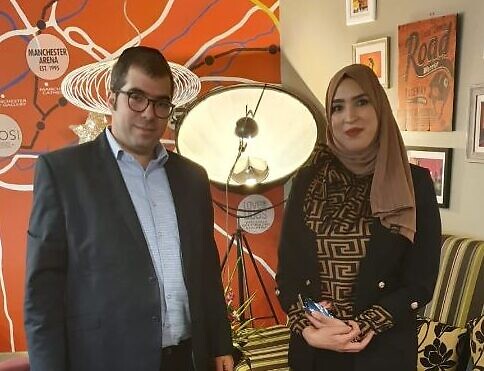A video of a hijab-wearing Muslim woman confronting an anti-Semite on a London Underground train last week has been shared widely online, both here in the U.K. and beyond. The viral clip has prompted many of us to question our assumptions about how members of Muslim and Jewish communities interact — especially as political tribalism and divisions become more entrenched on both sides of the Atlantic.
The abuser in the anti-Semitic incident aggressively read anti-Jewish passages from the Bible to two young Orthodox Jewish boys who were travelling with their father. He accused them of “starting the slave trade” and belonging to “the Synagogue of Satan”. He only stopped when he was confronted by fellow passenger Asma Shuweikh.
Yahoo news – Muslim woman confronts man shouting anti-Semitic abuse at family on London Tube https://t.co/0W8K8lwppg
— Chris Atkins (@scatatkins) November 22, 2019
Although it has become more common in recent years, anti-Semitism is always shocking, particularly when the victims include, as in this case, young children who were subjected to what bystanders described as a “fifteen to twenty minute rant”, a small part of which went viral on social media.
The subtext to much of the reaction is not only shock at the incident itself, but surprise that a visibly Muslim woman would jump to the defense of Jewish victims of hatred — even after the (male and physically robust) attacker had already threatened physical violence.
Yet this is a fairly typical Muslim response to anti-Semitism, similar to the American Muslim groups who raised thousands for victims of the Pittsburgh Synagogue shooting last year, or the Norwegian Muslims who formed “rings of peace” to protect Jewish places of worship after similar attacks.
Antisemitism and Islamophobia, a common problem
No community is completely immune from indulging in prejudice. But the idea that Muslims and Jews do not get on, or that anti-Semitism is everywhere in Muslim communities, or even a strain within Muslim culture itself, is a stereotype. In reality, diaspora Muslims are more often on the same side as their Jewish brethren — not least when it comes to receiving abuse.
Both communities are minorities with a history of being disenfranchised and hated. Both groups want to be seen as human beings, rather than avatars of global conflicts in which they have no say.
Both communities are minorities with a history of being disenfranchised and hated. Both groups want to be seen as human beings, rather than avatars of global conflicts in which they have no say. And crucially, the conspiracy theories about secret Muslim plans for worldwide domination and the creation of “Eurabia” closely mirror far-right conspiracies about Jewish power and influence.
Anti-Semitism and Islamophobia, despite looking and feeling very different on the outside, or often two sides of the same coin. It is no coincidence that many so-called alt-right figures express hatred of Jews and Muslims, leading the two communities to grow even closer together.
Historical examples of tolerance
 This is not a recent development. For much of history, Jewish-Muslim solidarity was the norm, and not the exception. While most of Europe was going through the violent and divided Middle Ages, Jewish citizens in Islamic Spain, or Al-Andalus, were treated as equals. There were even Jewish ministers like Hasdai Ibn Shaprut. Under Muslim rule, Cordoba became a centre of Talmudic study, at the same time as Jews were persecuted elsewhere by the Catholic Church.
This is not a recent development. For much of history, Jewish-Muslim solidarity was the norm, and not the exception. While most of Europe was going through the violent and divided Middle Ages, Jewish citizens in Islamic Spain, or Al-Andalus, were treated as equals. There were even Jewish ministers like Hasdai Ibn Shaprut. Under Muslim rule, Cordoba became a centre of Talmudic study, at the same time as Jews were persecuted elsewhere by the Catholic Church.
This “Golden Age” of Jewish culture in Spain came to an abrupt end with the fall of Granada in 1482, which swiftly led to the inquisition, in which both Muslims and Jews were persecuted for their beliefs.
This semitic solidarity between Arab and Jew goes back even further to the Prophet Muhammad’s time, where Jewish communities were honored as “people of the book.” Intermarriage was common, and community cohesion was protected through constitutionally-assured equal rights and covenants.
It is this heritage that Jewish communities with roots in Muslim-majority regions, Shephardic and Mizrahi Jews, inherited in later years. Even in Israel, the epicenter of supposed Muslim-Jewish tension, nearly two-thirds of Jewish Israelis are descended from Mizrahi stock.
It is this heritage that Jewish communities with roots in Muslim-majority regions, Shephardic and Mizrahi Jews, inherited in later years.
It is inevitable that any discussion of Jewish-Muslim relations will mention the Holy Land, and the conflict surrounding it. This is the prism through which relations are viewed and where our subconscious (or conscious?) surprise at a Hijab-wearing woman defending an orthodox Jewish family on the London Underground comes from.
A lesson to learn
Too often the conflict in the Middle East is presented as a religious one. This is understandable, since many of Israel’s most assertive policies in the region — including last year’s controversial “nation state” law — are fueled by explicitly religious arguments from the country’s right wing. This religious rhetoric is reflected in many of the Palestinian and Arab resistance movements, most of which have an Islamic flavor.
The broader conflict and occupation, however, is about much more than faith. Religion is the scenery, not the territory of this conflict, and we must always remember that.
There is clearly a correlation between Jewish people having a more pro-Israel position and Muslims being more pro-Palestinian. This divide will only widen if we do not protect responsible, respectful and rational debate, held far away from the murky waters of anti-Semitism and Islamophobia.
It is this debate that I have been committed to in my decades of campaigning for a just settlement in the region that recognises the rights of Muslims, Jews, Christians, Druze and others. On this journey I have had many Jewish and Christian allies as well as people of no faith, and countless Muslim opponents.
In this age of identity politics, it is easy to forget about the universal values that unite us, and focus on the labels that divide us. But it is those values that we must hold on to, and that can protect us all, whatever happens in the U.K. election next month or the U.S. election next year.
These values can transcend our natural impulse for us all to sympathise with our coreligionists, sometimes to the exclusion of others. They can even compel a woman to put herself in harm’s way for the sake of a stranger.
The prospect of peace in the Middle East might seem remote. But those trying to find the key to it might want to start with what happened on the London Underground last Friday morning.
Source: Time
*Massoud Shadjareh is the chair of the London-based NGO Islamic Human Rights Commission

















No Comments